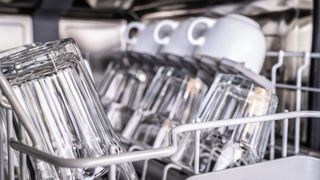Countertop dishwashers actually work in a very similar way to a regular dishwasher (opens in new tab), with fans and jets that target every area of your dishes and glasses. However, some will not have enough of an internal capacity to fit hefty pots and pans.
How do countertop dishwashers work?
Regular dishwashers typically have a fan that propels water around the inside, in order to distribute water across the bottom and top of the machine. In countertop dishwashers, the water is added with a spinning dispenser fan at the top of the machine. You’ll be relying on a fan that sits underneath the tray and circulates clean water around all of your dishes and cutlery. This can get inside cups and downward-facing glasses. Even if your countertop dishwasher is not plumbed in, you will still need to give it a place to empty out the dirty water. You can place the hose to empty your portable dishwasher into your sink, or place a large bucket underneath the dishwasher and simply empty this when the cycle is done.
Types of countertop dishwashers
There are two main types of countertop dishwashers. Some have an in-built water tank that holds all the water it will need to clean your dishes, whereas others need to be connected to a faucet. These also expel dirty water as they clean, and so much be used in close proximity to a sink. Some (such as our top pick, the Farberware FDW05ASBWHA (opens in new tab),) have an optional water tank to work when you don’t have access to a water hookup, but without limiting you to use near a faucet.
How to hook-up a countertop dishwasher
You do need to plug a countertop dishwasher into a power source in order to use it, but it does not need to be plumbed into your home. This makes it perfect for renters or those who don’t have the right space. They are even suitable for those in RVs or dorm rooms. To attach your countertop dishwasher to a faucet you’ll need to connect a hose to the back of your dishwasher, and then screw it into the faucet to provide a consistent water supply. You may need to buy an adapter to enable you to screw the hose in, to check this before you buy. If your countertop dishwasher leaks, this is a sign that you haven’t screwed in the hose well enough. It should come with a sturdy Philips screw that can tighten fully to secure the hose and prevent it from spilling water on your countertop. When setting up your new countertop dishwasher, do an experimental shorter cycle to make sure everything is working as it should, and sit nearby to monitor for leaks and spills.
Where is the best place to put a countertop dishwasher?
Your countertop dishwasher should sit in close proximity to your sink if it needs to be connected to the faucet. However, you’ll get more flexibility if it has a water tank. Some people place their countertop dishwasher on a portable trolley, which allows them to wheel it in and out of storage as and when it’s needed. Countertop dishwashers typically weigh between 40 and 50 pounds, so you should get an idea of whether you will find it easy to lift and remove the dishwasher from your counter if you need to use your countertop during the day. If you plan on storing your countertop dishwasher below the water level of your sink or alternative drain, you will need to buy one with a pump in order to expel the dirty water.
What is the difference between dishwashers and countertop dishwashers?
Much like the best dishwashers (opens in new tab), a countertop dishwasher will come with allocated spaces for knives and forks, cups and glasses, and all your tableware for easy cleanup after a meal. Countertop dishwashers are very small when compared to a full-size. They typically have enough space for about five place settings, plus cutlery. This can be useful for those in smaller homes or households, because you won’t waste water and electricity running a full-size dishwasher below the full capacity. However, large households will find that they need their countertop dishwasher to run multiple times a day to stay on top of the dirty dishes. While they may not come with as much space, countertop dishwashers have the advantage of not needing to be plugged in. Countertop dishwashers can sit on top of kitchen counters or even a portable cart to be accessed easily and stowed away when not in use, which is valuable when space is at a premium in your home. If you are a renter whose landlord will not allow you to install a full-sized dishwasher, this is the perfect solution.
Are countertop dishwashers any good?
We think countertop dishwashers are perfect for renters and those who are short on space in their homes but hate doing the dishes. However, they’re not the best choice for everyone. For one, some countertop dishwashers actually cost about the same as a full-sized dishwasher, so you won’t necessarily be saving money if you buy one. That said, the energy savings with a countertop dishwasher are particularly impressive, and many are Energy Star certified, such as the Magic Chef MCSCD6B5 (opens in new tab). Countertop dishwashers are a good way to cut down on your water usage because a regular size dishwasher will use about 10 gallons each and every wash, whereas a countertop will only use two or three.








